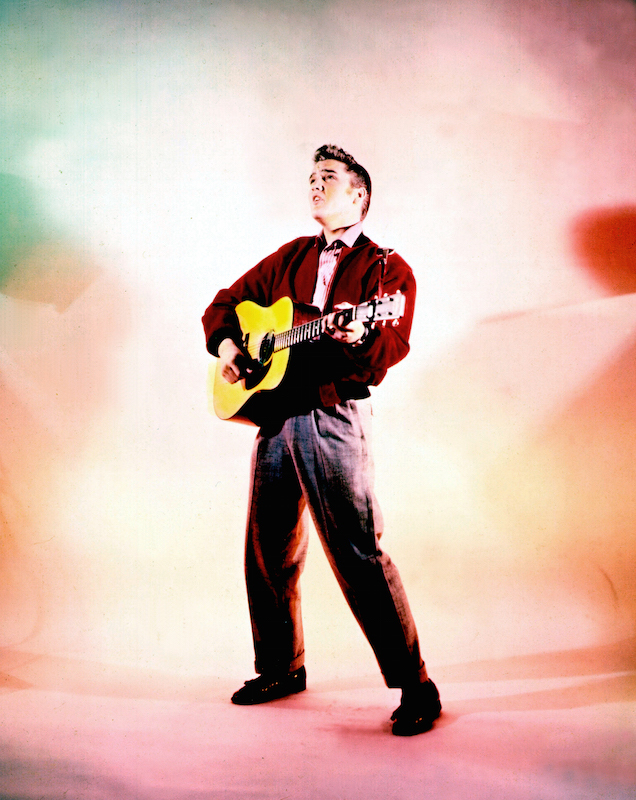
When Elvis Presley died 40 years ago — on Aug. 16, 1977 — TIME’s music critic Jay Cocks turned to one song to memorialize the king of rock ‘n’ roll: the 1955 tune “Mystery Train,” the lyrics to which began Presley’s obituary. It was one of the last of the early Elvis tunes released before he changed the world with Heartbreak Hotel and launched a new era for American music.
Only about two decades passed between that fateful recording session and the day he was found in his bathroom, on the floor, and could not be revived.
His death struck TIME’s critic as yet another chapter in the same old story about celebrities who die too soon, victims in part of their own success — and of the battle to be everything to everybody. In Elvis’ case, the struggle with being a sex object to his fans and a good Christian to their parents took its toll, as Cocks explained:
So the legend goes: nothing kills America’s culture heroes as quickly and surely as success. Presley burnt himself out, as if on schedule. He had been thirsty for glory. Born in Tupelo, Miss., he was an only child whose parents scraped along on odd jobs until the family moved to Memphis when Elvis was 13. He was fanatically and unabashedly devoted to his mother. He was buried near her after the kind of awful, agonized public wake that attended the passing of Rudolph Valentino and Judy Garland. Eighty thousand fans jammed the street outside his Memphis mansion, Graceland, hoping for a view of the body; 30,000 were admitted to the house. Dozens swooned, cried, keened and passed out from the heat outside the mansion gates. Two people were killed when a drunken driver plowed into the crowd. After the funeral at Graceland, a cortege of 16 white Cadillacs led a slow procession down Elvis Presley Boulevard to the cemetery. There the lawn was banked with some 2,200 floral tributes — an imperial crown of golden mums, hortisculptured hound-dogs and guitars, sunflowers in wine bottles. Memphis ran out of flowers; reinforcements were sent in from California and Colorado.
…Presley was not, as he has so often been called, “the father of rock ‘n’ roll,” but he was the first to consolidate all its divergent roots into a single, surly, hard-driving style. Rock had its origins deep in rhythm and blues, which, in a time of strict musical segregation, was black music all the way. Presley gave rock and blues a gloss of country-and-western and a rockabilly beat, but he preserved the undertones of insinuating sexuality, accentuated rock’s and blues’ rough edges of danger from the sharp beat to the streetwise lyrics. “It was like a giant wedding ceremony,” Marion Keisker said later, “like two feuding clans who had been brought together by marriage.”
Those early Sun sides, typified by the wonderfully spooky, smoky Mystery Train, were arguably the best music Elvis ever made. The more familiar songs, like Heartbreak Hotel, Hound Dog and Don’t Be Cruel are great tunes, joyful and sassy. They have become cultural artifacts, but no amount of historical respectability can fully dim their raucous vitality. They also represent a high point. Only four or five years after they came out, Presley‘s music had virtually become a patented mixture of heavy breathing and hokum.
…It was style as much as the songs he sang that made Elvis Presley such an immediate, and ultimately irreplaceable, phenomenon. Initially, it was all a matter of attitude, the low lids, the lip that curled up like a whitecap before breaking on the beach, the musky voice that seemed to take its honey coating from a lot of scruffy worldliness and its distinct throb from straight below the waist. His first appearances were small Pop cataclysms. The sensuous movements that headline writers called “gyrations” and that earned Presley nicknames he did not like—Swivel Hips, the Pelvis—had their roots in roistering responses of some fundamentalist congregations.Offstage his deferential manner toward adults, his shy country-boy come-on to women, made him seem, whatever heights of fame he achieved, strictly and forever down home. He defined himself, as Critic Greil Marcus points out in an excellent Presley essay, “by presenting his authentic multiplicity. I am, he announced, a house rocker, a boy steeped in mother-love, a true son of the church, a matinee idol who’s only kidding, a man with too many rough edges for anyone ever to smooth away. Something in me yearns for a settling of affairs, he said with his pale music and his tired movies; on the other hand, he answered with his rock ‘n’ roll and occasional blues, I may break away at any time.”
He never did. Not really. His later stage shows were full of intentional self-parody; he took to telling audiences “this lip used to curl easier.”
But the legend of Elvis, Cocks noted, would continue to grow (and not just because many of his fans and true crime enthusiasts are still coming out with theories about what really happened to him). He had helped to define a generation, and now that generation could go on without him.
Read the full remembrance from 1977, here in the TIME Vault: Last Stop on the Mystery Train
More Must-Reads from TIME
- Cybersecurity Experts Are Sounding the Alarm on DOGE
- Meet the 2025 Women of the Year
- The Harsh Truth About Disability Inclusion
- Why Do More Young Adults Have Cancer?
- Colman Domingo Leads With Radical Love
- How to Get Better at Doing Things Alone
- Michelle Zauner Stares Down the Darkness
Write to Olivia B. Waxman at olivia.waxman@time.com